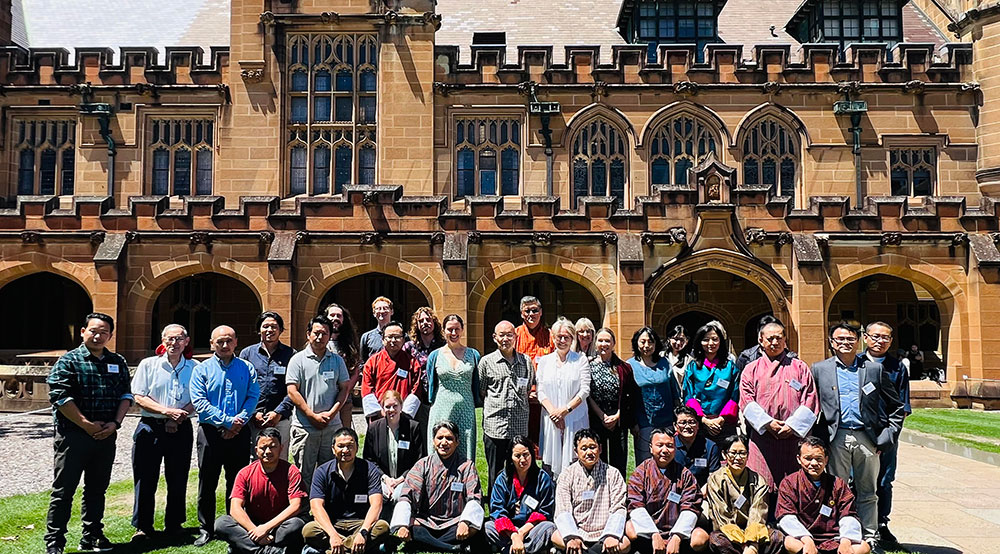From indigenous taxonomies of life in linguistics of Khengkha, Bhutan’s climate, agriculture, science, and education to issues related to migration were discussed in depth at the University of Sydney (USYD) in Australia earlier this week.
The Bhutan Embassy in Canberra, and USYD organised a conference that brought together Bhutanese researchers and researchers on Bhutan together.
The conference held on December 4 and 5 aimed to showcase the significant contributions of Bhutanese scholars in Australia while fostering an environment for cross-cultural exchange, innovative thought leadership, and potential collaborations.
Expected to serve as a platform to catalyse new business opportunities, innovative projects, and cultural appreciation between Bhutan and Australia, the conference was also bridging academic and business landscapes.
It was also set to spark transformative solutions to global challenges, deepen diplomatic ties, and highlight shared commitments towards sustainability and inclusivity.
Bhutan’s ambassador to Australia, Sonam Tobgay, said the conference’s theme, ‘Intersections of culture, climate, and science,’ resonates with the challenges and opportunities faced by many countries, including Australia and Bhutan. “Its timing coincides with Bhutan’s ongoing rapid transformation where while preserving our unique cultural heritage and conserving our natural environment, we are making efforts to embrace technological advancements.”
He also said the conference will serve as a valuable platform for sharing knowledge, exchanging ideas, and collaborating on innovative solutions that can also contribute to the transformation underway in Bhutan.
“Australia, with its world-class institutions and cutting-edge research, can be a valuable partner in this endeavour, which will undoubtedly strengthen ties among our scholars, and foster collaborative research projects and knowledge-sharing initiatives to address common challenges. It will also be a good avenue to strengthen our bilateral ties,” Sonam Tobgay said.
Ambassador Sonam Tobgay also said that he was confident the conference would also generate good ideas so that Bhutanese scholars and the embassy, can organise themselves better to find avenues for Bhutan to benefit from the skills, expertise and rich experiences of scholars regardless of where one is in Australia.
The deputy vice chancellor and provost of USYD, Professor Annamarie Jagose, said the university is making connections between Bhutan and their STEM researchers, notably engineering.
According to the vice-chancellor, Bhutan is known globally as a leader for its environmental preservation, rich biodiversity and cultural dynamism. “As many of you will know, fifty years ago, the Fourth King presciently committed Bhutan to remain permanently carbon-neutral. He spoke of his development philosophy of Gross National Happiness, a mindful, compassionate, and sustainable model that looks beyond economic growth to such humanistic values as cultural preservation, good governance, and strength of community.”
The provost also said USYD, as a globally focused research institution, celebrates innovation and new ways of thinking and recognises Bhutan’s leadership on climate and science, as well as its unique culture. “We also have research collaborations with the Royal University of Bhutan, Centre for Bhutan Studies, Zhung Dratshang, Druk Holding and Investments, and Bhutan Media Foundation.”
According to Dr Bunty Avieson, who leads the conference organising team, they wanted to bring together the community of Bhutanese researchers from across Australia to their campus so they could learn about the research Bhutanese are doing.
“It was an amazing two days. The science research they presented is both wide-ranging and cutting edge, addressing urgent problems of climate and sustainability, work that will benefit the world,” she said.
She also said in the humanities, it was inspiring to see how researchers are bringing the Bhutanese worldview, so grounded in the philosophies of Gross National Happiness and community into their research. “I think the world needs that right now.”
While the conference sought to honour the many ways that Bhutanese have brought their life experiences and cultural perspectives to enrich research at universities across Australia, breaking new ground in environmental research, nature-inspired therapeutics, biotechnology, data science, epidemiology, linguistics, public health, and beyond, Bhutanese researchers said they felt privileged to share their work.
For Kaka (PhD), the conference provided a platform for Bhutanese researchers to share their research expertise and skills. “It was inspiring to see how our Bhutanese researchers, especially the young, and Australians researching subjects many of us never thought of.”
Meanwhile, a researcher professor in Arts and Humanities from ECU, Dr Vicky Banham, said ECU would conduct a similar conference next year. “We welcome researchers and all research students to Perth next year to continue the process of sharing their research with their colleagues from Bhutan and Australia.”
Contributed by
Tashi Dema
tdema@myune.edu.au


